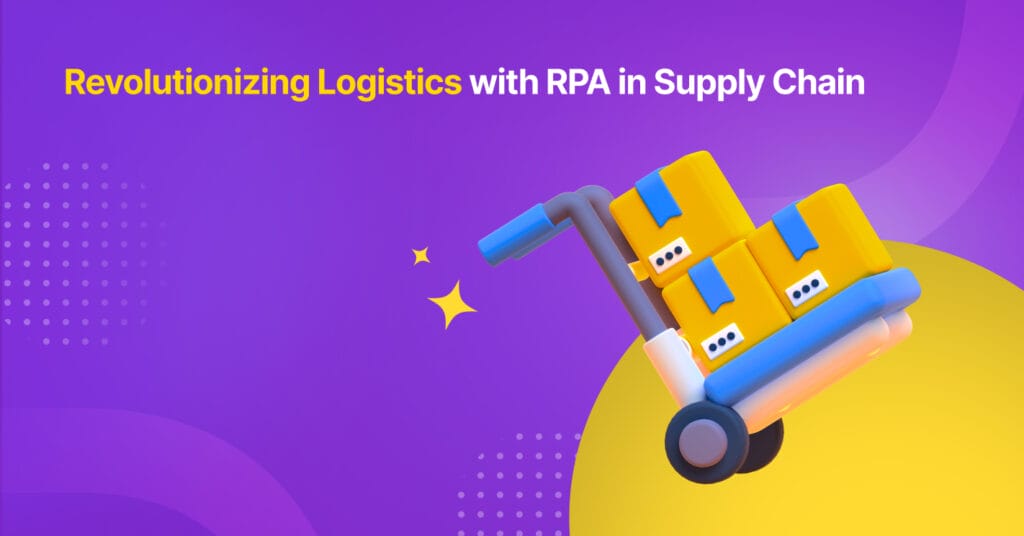Introduction
Every day, businesses face relentless pressure to deliver faster, cheaper, and more accurately. With global supply chains becoming increasingly complex, manual processes can no longer keep up with rising customer expectations and market fluctuations. Labour shortages and inefficiencies in handling repetitive tasks like order processing and inventory management further exacerbate these challenges.
Automation is no longer a luxury but a necessity for companies aiming to stay competitive. Robotic Process Automation (RPA) has emerged as a game-changing solution, allowing businesses to streamline operations, reduce errors, and respond swiftly to market demands. This article will explore how RPA transforms logistics and supply chain management, offering practical insights and real-world applications.
The Growing Demand for Automation in Logistics
The logistics and supply chain industry are experiencing a seismic shift toward automation. This shift is driven by a need to address rising operational costs, demand fluctuations, and the ever-increasing expectations for rapid deliveries.
Organizations that adopt automation are reaping significant benefits, including improved cost-efficiency, faster turnaround times, and enhanced customer satisfaction. Furthermore, global supply chain disruptions, such as those experienced during the COVID-19 pandemic, have accelerated the adoption of RPA technologies. Businesses are realizing that manual processes are too slow and error-prone to meet the agility required in modern supply chains.
Key Benefits of RPA in Supply Chain
RPA offers a wide range of benefits for logistics and supply chain operations, transforming how businesses handle their day-to-day tasks. Key advantages include:
- Efficiency & Speed: RPA automates repetitive, time-consuming tasks such as data entry and document processing, significantly reducing operational delays.
- Cost Savings: By minimizing manual intervention, businesses can cut labour costs and reduce the risk of human error.
- Accuracy & Compliance: Automated processes ensure accurate data handling, improve reporting and support regulatory compliance.
- Scalability: RPA solutions are flexible and can scale with business growth, enabling companies of all sizes to leverage automation.
Real-World Use Cases of RPA in Logistics
The practical applications of RPA in logistics are vast and impactful. Here are some key use cases:
- Order & Invoice Processing: Automating order confirmations, invoicing, and reconciliation to speed up transaction cycles and reduce errors.
- Inventory & Warehouse Management: Utilizing RPA to monitor stock levels, trigger replenishments, and optimize warehouse workflows.
- Shipment Tracking & Notifications: Providing customers real-time tracking updates, improving visibility and enhancing customer satisfaction.
- Demand Forecasting: Leveraging AI-powered RPA to analyze historical data and predict future demand, helping to optimize stock levels and minimize waste.
The Future of Logistics with RPA & AI
As technology continues to evolve, the integration of RPA with advanced artificial intelligence (AI) is opening new possibilities for the logistics industry. Predictive analytics and machine learning enhance decision-making capabilities, enabling smarter and more agile supply chain operations.
In the near future, businesses will rely on intelligent automation to anticipate market changes, optimize inventory management, and deliver superior customer experiences. Organizations that embrace RPA today are positioning themselves for long-term success in an increasingly automated world.
How to Get Started with RPA in Your Supply Chain
Implementing RPA in your supply chain requires a strategic approach to ensure maximum return on investment. Here are key steps to get started:
- Assess Existing Processes: Identify repetitive, manual tasks that can be automated for greater efficiency.
- Select the Right Tools & Partners: Choose robust RPA platforms like UiPath and work with experienced automation partners like Mitrais.
- Plan a Smooth Implementation: Develop a phased implementation plan, ensuring minimal disruption to existing operations.
- Measure & Optimize: Continuously monitor performance metrics and refine automation processes to achieve optimal outcomes.
At Mitrais, we specialize in helping businesses implement cutting-edge RPA solutions using tools like UiPath. Our team of experts can guide you through every stage of the automation journey, ensuring a seamless transition and measurable results.
Conclusion
The future of logistics lies in automation, and RPA is at the forefront of this transformation. By adopting RPA, businesses can achieve greater efficiency, accuracy, and scalability while meeting the demands of an ever-evolving market.
If you’re ready to future-proof your supply chain with RPA, Mitrais can help.
Contact us today to explore tailored RPA solutions that drive business growth and operational excellence.






